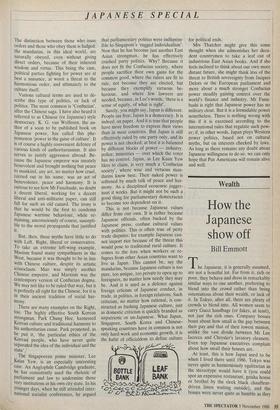JAPANESE SPECIAL
The distinction between those who issue orders and those who obey them is fudged: the mandarins, in this ideal world, are naturally obeyed, even without giving direct orders, because of their inherent wisdom and virtue. This being the case, political parties fighting for power are at best a nuisance, at worst a threat to the harmonious order, and ultimately to the culture itself.
Various cultural terms are used to de- scribe this type of politics, or lack of politics. The most common is 'Confucian', after the Chinese saga. I have also heard it referred to as Chinese (or Japanese) style democracy. K. G. van Wolferen, the au- thor of a soon to be published book on Japanese power, has called this phe- nomenon 'power in the guise of culture'. It is of course a highly convenient defence of various kinds of authoritarianism. It also serves to justify aggression abroad. Be- cause the Japanese emperor was innately benevolent and brought nothing but peace to mankind, any act, no matter how cruel, carried out in his name, was an act of benevolence, peace and harmony. It is curious to see how Mr Funabashi, no doubt a decent liberal, working for a decent liberal and anti-militarist paper, can still fall for such an old canard. The irony is that he would be the first to condemn Japanese wartime behaviour, while re- maining, unconsciously of course, suscepti- ble to the moral propaganda that justified it.
But, then, these myths have little to do with Left, Right, liberal or conservative. To take an extreme left-wing example, Maoism found many sympathisers in the West, because it was thought to be in line with Chinese culture, despite its artistic iconoclasm. Mao was simply another Chinese emperor, and Marxism was the contempory version of Confucian dogma. We may not like to be ruled that way, but it is perfectly all right for the Chinese, for it is in their ancient tradition of social har- mony.
There are many examples on the Right, too. The highly effective South Korean strongman, Park Chung Hee, harnessed Korean culture and traditional harmony to his authoritarian cause. Park promoted, as he put it, 'the particular ethics of the Korean people, who have never quite separa ed the idea of the individual and the state'.
Ti Singaporean prime minister, Lee an Yew, is an especially interesting case. An Anglophile Cambridge graduate, he has consistently used the rhetoric of parliament and law to undermine those very institutions in his own city state. In his younger days, when he still attended inter- national socialist conferences, he argued that parliamentary politics were indispens- ible to Singapore's 'rugged individualism'. Now that he has become just another East Asian strongman, he has effectively crushed party politics. Why? Because it does not fit the Confucian society, where people sacrifice their own gains for the common good, where the rulers are fit to rule, not because they are elected, but because they exemplify virtuous be- haviour, and where few lawyers are needed, because, in Lee's words, 'there is a sense of equity, of what is right'.
Surely, you might say, Japan is different. People are free; Japan is a democracy. It is indeed, on paper. And it is true that people have more freedom to express their views than in most countries. But Japan is still effectively ruled by one party only, and its power is not checked; at best it is balanced by different blocks of power — industry. police, ministries — over which the voter has no control. Japan, as Lee Kuan Yew likes to claim, is very much a 'Confucian society', where wise and virtuous man- darins know best. Their naked power is softened by much talk of peace and har- mony. As a disciplined economic jugger- naut it works. But it might not be such a good thing for parliamentary democracies to become too dependent on it.
This is not because Japanese values differ from our own. It is rather because Japanese officials, often backed by the Japanese press, confuse cultural values with politics. This is often true of petty trade disputes: for example Japanese can- not import rice because of the threat this would pose to traditional rural culture. It comes to the fore when workers or re- fugees from other Asian countries want to live in Japan. This cannot be, say the mandarins, because Japanese culture is too pure, too unique, too private to open up to foreigners, no matter how needy they may be. And it is used as a defence against foreign crticism of Japanese conduct, in trade, in politics, in foreign relations. Such criticism, no matter how rational, is con- structed as bashing Japanese culture, just as domestic criticism is quickly branded as unpatriotic or un-Japanese. What Japan, Singapore, South Korea and Chinese- speaking countries have in common is not only hard work and economic growth, it is the habit of officialdom to define culture for political ends.
Mrs Thatcher might give this some thought when she admonishes her deca- dent countrymen to take a leaf out of industrious East Asian books. And if she feels inclined to think about our own more distant future, she might think less of the threat to British sovereignty from Jacques Delors or the European parliament and more about a much stronger Confucian power steadily gaining control over the world's finance and industry. Mr Funa- bashi is right that Japanese power has no military clout. But it is a formidable power nonetheless. There is nothing wrong with this if it is exercised according to the international rules that regulate such pow- er; if, in other words, Japan plays Western power politics, based not on cultural myths, but on interests checked by laws. As long as there remains any doubt about Japanese willingness to do so, we can only hope that Pax Americana will remain alive and well.


































































 Previous page
Previous page